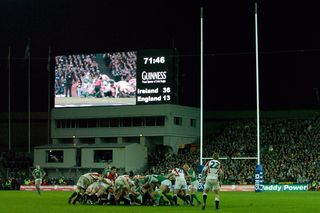Hiding in plain sight: the man who knows so much
Shane Phelan on why Drumm is so controversial
David Drumm in 2008 at the publication of the Anglo Irish Bank annual results in Dublin. Photo: James Horan/RollingNews.ie
The story of David Drumm is a potent reminder of the moral bankruptcy of the Celtic Tiger era. While public anger against other figures from the crash has dimmed to a certain extent, it has endured in the case of Drumm.
The reason for this is simple.
Here is a man who was at the helm of Anglo Irish Bank and who must shoulder a degree of blame for the state the country found itself.
He was at the epicentre of the economic earthquake and can potentially answer a lot of the key questions which remain about the crash.
But instead of facing the music, he is a fugitive from the law, hiding in plain sight in an affluent Boston suburb, having given the proverbial two fingers to the gardaí and the Office of the Director of Corporate Enforcement.
The intricacies of the extradition process mean it is by no means certain he will be seen in an Irish courtroom any time soon.
The country wants to move on from the bust, but that process is proving difficult when people like Drumm have not been brought to account in some way or other.
For closure to happen, justice must be done or at least be seen to be done.
There are other reasons why Drumm remains a hate figure.
Characterised as a swashbuckling go-getter while he was in charge of Anglo Irish Bank, the public perception of him has changed dramatically and he is now regarded as having been both cavalier and callous.
Some of his behaviour since leaving the bank indicates a complete lack of concern about paying off debts.
How else can he explain the maxing out of his $14,000-limit credit card through spending on furniture, entertainment, fine wines and eating out in the weeks before he filed for bankruptcy?
Even when a court first began hearing those proceedings, Drumm had the audacity to have painters and decorators working on a basement conversion of his $2m home.
His refusal to return home has shown him to be a coward too.
Judge Frank Bailey said Drumm was "adept in testimony intended to deflect, misdirect, avoid [and] fabricate".
Instead of owning up, Drumm has tended to blame others.
When he was caught out for failing to disclose large sums of money he had transferred to his wife, Drumm blamed his then legal advisors, claiming they had told him he did not need to do so.
In his controversial statement to the banking inquiry, he argued that Anglo had taken an unfair share of the blame for the economic crash.
In one of the few interviews he has done since entering his self-imposed exile, Drumm said the reason he would not return home was that he did not believe he would be fairly treated.
But how does he know?
Charges of false accounting and conspiracy to defraud await him here. There is every reason to expect he would get a fair trial.
The Irish legal system is renowned for its fairness and its constitutionally protected right to due process. Juries have consistently demonstrated they are capable of setting aside their biases and feelings.
Drumm cannot hide away forever. Sooner or later there will be a day of reckoning.
Join the Irish Independent WhatsApp channel
Stay up to date with all the latest news














